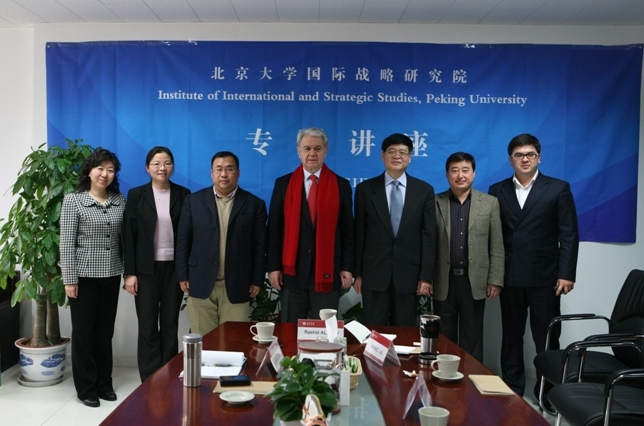On February 21, 2014, the Ambassador Extraordinary and Plenipotentiary of the Republic of Tajikistan to the People’s Republic of China, Rashid Alimov, visited the IISS and attended a meeting to discuss China-Tajikistan relations and the Shanghai Cooperation Organization. Present at the meeting were Prof. Wang Jisi, Associate Prof. Guan Guihai and Associate Prof. Qian Xuemei from IISS, Associate Prof. Wu Bingbing from the School of Foreign Languages of Peking University, and two students from the School of International Studies, Peking University.

Looking back on the accomplishments during the two periods since China and Tajikistan established diplomatic relations in 1993, Ambassador Alimov praised the progress made by two countries as a “journey of the century.” He said, during these 20 years of working on mutual trust, heads of both states have achieved abundant substantial outcomes in their frequent meetings. Former President Hu Jintao met with President Rahmon fourteen times during his two terms, and President Xi Jinping has also met President Rahmon twice since his inauguration. The major progress in bilateral relations is exemplified by the China’s possession of the largest share of Tajik foreign investment stock, by the more than 150 Chinese enterprises who have massive joint projects in cooperation with Tajikistan, by the activeness of Chinese companies in Tajik mining industry, by the telecom optical cable jointing between the two countries, by the facilitation of traffic between China and Tajikistan, by the natural gas pipelines which enhance bilateral economic interaction, and by the satisfying cooperation between armed forces in both countries.
After acknowledging past accomplishments, Ambassador Alimov expressed his best wishes for a deepening of bilateral cooperation between China and Tajikistan. He pointed out China’s growing market need for pollution-free natural products, such as dried and fresh fruit, snowmelt water, and honey, which are rich in Tajikistan. China is currently importing these products from remote areas, such cherries from Chile and almonds from California, U.S., which is geographically disadvantageous. Adding to the wish to deepen bilateral economic cooperation, Ambassador Alimov also expected the enhancement of cooperation in technology and education, as well as exchange of students.
Ambassador Alimov addressed the “New Silk Road Economic Belt” initiative proposed by President Xi Jinping. He was convinced that Tajikistan possesses enough talent resources to put such a design into practice, and is willing to expand the communication and cooperation with China in humanities. He also attributes Tajikistan’s continuous economy growth, social prosperity, and stabilization over the past 14 years to joining the Shanghai Cooperation Organization. (SCO). This year, it will host the SCO summit. Tajikistan has finished its first round negotiation with the Chinese Ministry of Foreign Affairs, and is preparing for the visit of President Xi Jinping to Tajikistan in September.
In the Q&A session, Prof. Wang Jisi consulted the ambassador about development of tourism in Tajikistan and possible Tajiki Afghanistan policy. Ambassador Alimov said that Tajikistan now has a fairly mature tourism industry with service, facilities and various characteristic eco-tourism to satisfy differentiated needs of tourists, and he heartily expects overseas tourists. In his personal opinion, furthermore, the ambassador believes that Afghanistan has pursued a good relationship with its neighbor. He also thinks Afghanistan should solve its problems – chiefly, its relations with Pakistan and cooperation with the Taliban – by itself.
Associate Prof. Qian Xuemei consulted Ambassador Alimov about Dr. Abdullah Abdullah, the most popular presidential candidate in Afghanistan 2014 election; the fourth minister conference of the Istanbul Process, which is soon to be held in China; and the Confidence Building Measures agreed by participants in the conference. Ambassador Alimov spoke highly of Dr. Abudullah Abudullah. He believes the fact that the latter is half Tajiki represents the current situation in Afghanistan. Whether he will take the office depends largely on the worldwide attitude towards the election in Afghanistan. The only thing Afghanis can do in the election is to unite together. Ambassador Alimov holds high expectations on the Istanbul Process. Mentioning the “New Silk Road Economic Belt” initiative proposed by President Xi Jinping to put the mutual effort of multiple countries into effect, the ambassador addressed that issues such as the starting point, participants, specific routes and related fields of the economic belt still need to be clarified. Yet the actual result benefitting those countries should be more important that the process in which countries draw their plans together, which is no more than a formality.
Associate Prof. Wu Bingbing asked about the general view towards Iran in Tajikistan. Ambassador Alimov said, despite the distinct Islamic faith of Sunnite (Tajikistan) and Shi'ites (Iran), the two countries share common culture and similar language, and have been closely connected in spite of their disagreements. The prosperity of Iran will also bring favorable conditions for spreading the Tajiki language.
After the discussions, participants made group photos and exchanged gifts, which concluded the meeting in a congenial atmosphere.

